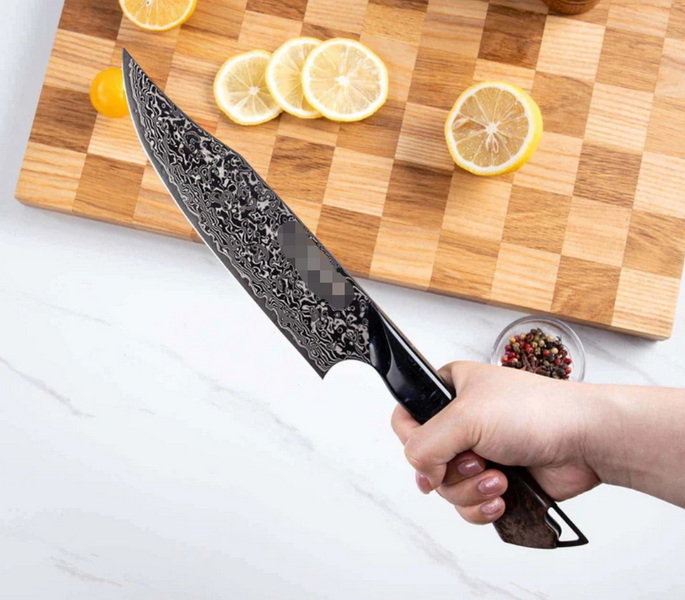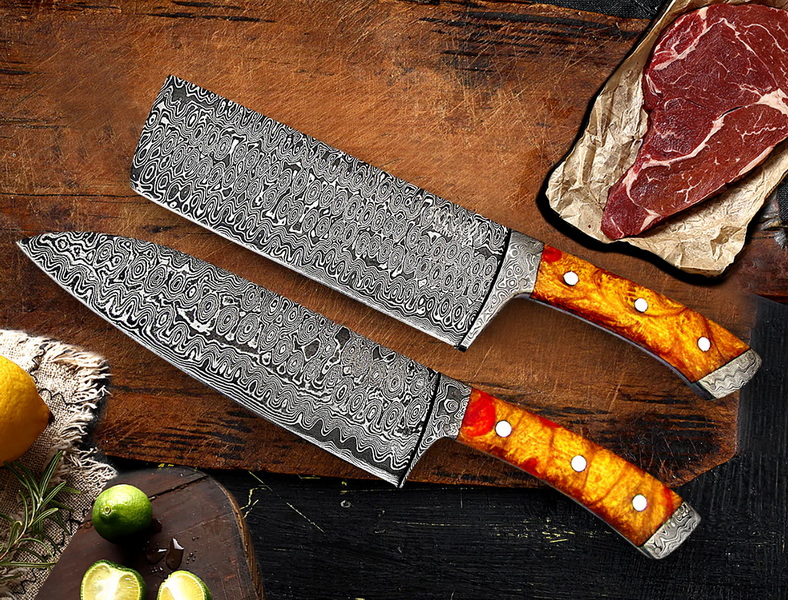- All
- Product Name
- Product Keyword
- Product Model
- Product Summary
- Product Description
- Multi Field Search
Views: 222 Author: Ann Publish Time: 2025-10-18 Origin: Site











Content Menu
● What Makes a Damascus Knife Special?
>> Superior Blade Sharpness and Edge Retention
>> Enhanced Structural Strength
● Cutting Precision Benefits of Damascus Knives
● Ergonomic Comfort in Damascus Knife Design
>> Superior Balance and Weight
● Versatility Across Cutting Tasks
● Damascus Knife Blade Construction and Material Science
● The Aesthetic Appeal of Damascus Knives
● How Damascus Knives Improve Kitchen Efficiency
● Global Market Trends and Damascus Knife Popularity
● Care and Maintenance Tips for Damascus Knives
● Selecting the Right Damascus Knife for Your Kitchen
● Frequently Asked Questions about Damascus Knives
>> 1. What is a Damascus Knife made of?
>> 2. How do Damascus Knives maintain sharpness?
>> 3. Are Damascus Knives difficult to sharpen?
>> 4. Can Damascus Knives be used for heavy chopping?
>> 5. How should I care for a Damascus Knife?
Damascus knives have long captivated chefs and culinary enthusiasts around the world. Known for their striking patterns and exceptional performance, these knives do more than just look beautiful — they deliver unmatched cutting precision and ergonomic comfort. In this article, we explore the unique properties, design details, and practical advantages of Damascus knives, and explain why they remain at the pinnacle of high-quality kitchen cutlery.

Damascus knives are famous for their layered steel construction. Traditionally, layers of soft and hard steel are forge-welded and folded repeatedly, producing a blade with a unique pattern and superior mechanical properties. This craftsmanship gives the Damascus knife a blend of flexibility, hardness, and sharpness, making it ideal for precision cutting.
The forging process creates a blade edge that is sharper and longer-lasting compared to many conventional knives. Damascus knives maintain their edge through countless cutting tasks, reducing the frequency of sharpening and enhancing cutting accuracy.
The layered steel construction offers a balanced combination of durability and toughness while resisting brittleness. This ensures that even under heavy use, Damascus knives stay resilient without chipping or breaking.
The Damascus Knife is engineered with high attention to detail that directly improves cutting precision in kitchen tasks. Here are some factors contributing to this precision:
- Fine Edge Geometry: The blade is typically ground to a very fine angle (often between 12° to 16° per side), allowing micro-thin and precise slicing.
- Even Weight Distribution: Through expert forging and handle design, these knives provide balanced weight, promoting controlled and accurate cuts.
- Minimal Food Adhesion: The unique layered pattern helps reduce friction and food sticking to the blade, facilitating cleaner and faster cuts.
Apart from precision, comfort during use is critical in selecting kitchen knives. Damascus knives excel in ergonomic design in several ways:
High-quality Damascus knives often feature handles made from premium wood, resin, or composite materials. These materials are shaped ergonomically to fit comfortably in the hand, reducing fatigue during prolonged use.
Damascus knives are forged with balanced weight distribution between the blade and the handle, ensuring the knife feels natural and steady throughout cutting motions. This reduces strain on the wrist and fingers and enhances user comfort.
Many Damascus knives have textured or contoured handles, providing a secure grip even when hands are wet, which improves safety and precision during cutting.
The Damascus Knife is suitable for a wide range of culinary tasks due to its precision and comfort:
- Slicing and Dicing: Ideal for vegetables, fruits, and meats with clean, sharp cuts.
- Filleting Fish: The fine sharp edge allows delicate and accurate filleting.
- Chopping Herbs: The balanced design facilitates quick and effortless chopping.
- Butchering: Hardened yet flexible blades handle tougher food items safely.
The magic of a Damascus Knife lies in its blade construction. Modern Damascus knives often combine different types of stainless steel or high carbon steel layers to maximize the benefits of both materials. These layers are forge-welded with precise control over temperature and pressure, resulting in a blade that has enhanced hardness on the edge while maintaining flexibility.
This multi-layer blade structure produces a remarkable combination of characteristics:
- Wear Resistance: Hard steel layers resist abrasion and wear from frequent cutting.
- Corrosion Resistance: Stainless layers protect the blade from rust and oxidation.
- Shock Absorption: Alternating soft steel layers provide shock damping, reducing stress and preventing cracks.
This material science breakthrough enables Damascus knives to perform in demanding kitchen environments without sacrificing cutting edge longevity or comfort.

Beyond functionality, the Damascus Knife is treasured for its beautiful and distinctive pattern. The layered forging process produces unique wave-like, flowing, or ladder patterns on the blade. This aesthetic is a result of the contrast between different steel layers reacting differently to acid etching during manufacturing.
This artistry not only makes every Damascus Knife visually striking but also symbolizes traditional craftsmanship fused with modern technology. For collectors and chefs alike, owning a Damascus knife is both a practical asset and a work of art.
Using the right knife can streamline kitchen tasks significantly. Damascus knives, with their sharp edges and balanced design, help users:
- Reduce Effort: Less force is needed to cut through food, preventing hand fatigue.
- Increase Speed: Precise cuts are quicker, accelerating food preparation.
- Enhance Safety: Sharp edges reduce the risk of slips, while ergonomic grips provide handling security.
Professional kitchens especially rely on this combination to maintain speed, accuracy, and safety during peak hours.
In recent years, the demand for Damascus knives has surged internationally. Culinary professionals and enthusiasts seek superior tools that combine performance with elegance. OEM manufacturers in China, such as many in 阳江, produce high-quality Damascus knives tailored for export to premium markets in North America, Europe, and Asia.
Innovations in production have made it possible to offer Damascus knives with diverse handle materials, blade sizes, and price points, broadening accessibility while maintaining quality.
Maintaining the beauty and performance of a Damascus Knife requires proper care:
- Always hand wash with mild soap and dry immediately.
- Avoid harsh abrasives or dishwashers that can damage the blade or handle.
- Regularly oil the blade to prevent rust if it contains high carbon steel.
- Sharpen with appropriate whetstones to preserve the edge.
- Store in a dry, safe place ideally using dedicated knife blocks or sheaths.
Consistent maintenance prolongs the knife's life and keeps it performing at peak capacity.
When choosing a Damascus Knife, consider the following factors:
- Blade Length: Long blades (8-10 inches) for slicing, medium (6-8 inches) for versatile use, smaller for delicate tasks.
- Blade Thickness: Thinner blades provide precision while thicker ones offer robustness.
- Handle Material: Wood for natural grip and appearance, resin/composite for durability, metal for modern styles.
- Price and Brand: Quality crafting and materials often come at higher prices but ensures long-term value.
Custom OEM options allow brands or wholesalers to tailor Damascus knives according to regional preferences and cutting habits.
Damascus knives stand out not only for their unique, eye-catching patterns but also for their proven ability to enhance cutting precision and user comfort. Their expertly crafted blades combine sharpness with durability, while ergonomic handles provide improved control and reduced hand fatigue. Whether for professional chefs or passionate home cooks, the Damascus Knife offers a versatile, beautiful, and highly functional tool that elevates the culinary experience.

Damascus Knife blades are forged by layering soft and hard steel, creating a patterned blade with a balance of sharpness and strength.
The layered steel construction allows the blade to hold an ultra-sharp edge longer than typical knives, thanks to its unique microstructure.
No, they sharpen similarly to other high-carbon steel knives and benefit from regular use of whetstones.
Yes, Damascus knives balance toughness and flexibility, making them suitable for robust kitchen tasks, including chopping through bones in some designs.
Hand washing, drying immediately, avoiding dishwashers, and periodic oiling are key practices to preserve both beauty and function.
The Ultimate Professional Knives for Halal Butchery in Middle Eastern Kitchens
Chef Knife Size Guide: Choosing Between 6″, 8″, 10″, And 12″
Custom Knife Handles: How To Design A Chef Knife That Fits Your Hand Perfectly
Chef Knife Surface Treatments Guide: From Polished Migaki To Damascus Patterns
Inside Our Professional Knife Sample Room: Quality You Can See
Universal Knife Block Buying Guide: Modern Acrylic & ABS Knife Holders for Professional Kitchens
Universal Knife Block: The Complete Guide To Modern, Hygienic Knife Storage
The Complete Guide To Red Handle Knife Sets: Style Meets Functionality in The Kitchen
Professional Knives for Halal Butchery And Middle Eastern Cuisine